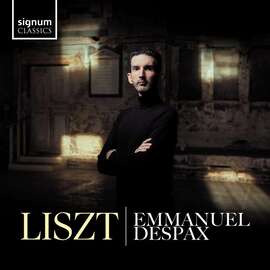Emmanuel Despax beginnt sein Liszt-Programm mit einer überraschend kontrastreichen, sehr persönlich phrasierten Interpretation der Dante-Fantasie. Sein Spiel ist in einem Maße fantasievoll, dass es leicht zu Manierismus hätte führen können, hier aber aus einem so richtig inspirierten Geist kommt und den Zuhörer in den Sog der Musik zieht. Eine großartige, virtuose und ausdrucksvolle, sehr spannende Interpretation!
Nicht weniger ausdrucksvoll, fein nuanciert und sehr verinnerlicht gespielt erklingen dann Bénédiction de Dieu dans la solitude, Funérailles und Nuages gris
In der h-Moll-Sonate mit ihren dramatischen und meditativen Passagen gelingt Emmanuel Despax ebenfalls eine gute Interpretation, die aber insgesamt nicht so spannend und zwingend wird, wie die zuvor gespielten Werke. Wohl findet er in den meditativen Zwiegesprächen und den Ruhephasen der Musik die Kraft, um die manchmal atemberaubenden Höhepunkte anzusteuern, aber ich finde die Darstellung der hymnischen Höhenflüge als etwas zu kühl und zu berechnet. Im letzten Satz freilich kann er mich mit ganz interessanten Phrasierungen wieder voll in seinen Bann ziehen.
Emmanuel Despax begins his Liszt program with a surprisingly contrasting, highly personal interpretation of the Dante Fantasy. His playing is imaginative to an extent that could easily have led to mannerism, but here it comes from such a truly inspired spirit that it draws the listener into the maelstrom of the music. A magnificent, virtuosic and expressive, very exciting interpretation!
The Bénédiction de Dieu dans la solitude, Funérailles and Nuages gris are no less expressive, finely nuanced and very intimately played.
Emmanuel Despax also manages a good interpretation of the Sonata in B minor with its dramatic and meditative passages, but overall it is not as exciting and convincing as the previous works. He has certainly found the strength in the meditative dialogues and the quiet phases of the music to reach the sometimes breathtaking climaxes, but I find the presentation of the hymnic flights a little too cool and calculated. In the last movement, however, he is able to fully captivate me again with very interesting phrasing.




















